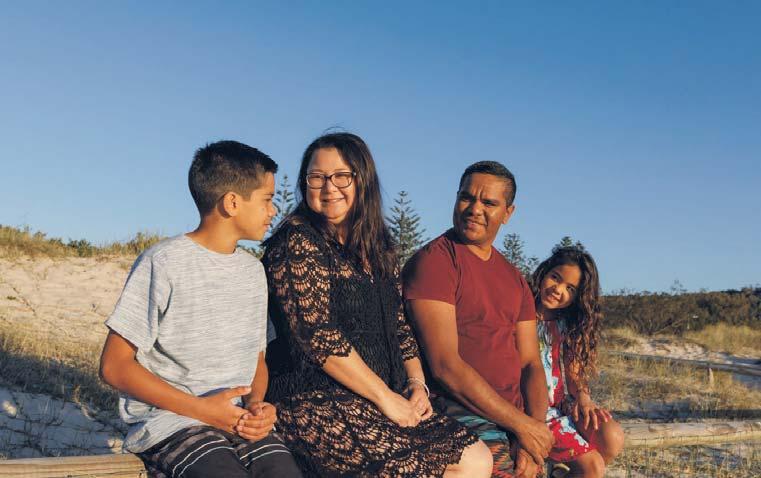
15 minute read
Giving hope through native restoration
Content Warning: this column was written without the assistance of ChatGPT. It includes strong environmental themes, over-used metaphors, and a large dose of shameless positivity.
Let us talk of rainbows and unicorns
An unusual thing happened last week – it was almost like unicorns exist!

Lismore MP, Janelle Saffin, gathered signatures of other local MPs and mayors and put the Northern Rivers Reconstruction Corporation (NRRC) on notice for their poor performance (see page 1 and 4).
And she told her boss, NSW Premier, Chris Minns, to get on with assisting those devastated by the 2022 floods. Unfortunately, Minns sounded fairly tone-deaf and uninformed when asked directly about the NRRC’s performance.
The answer of course, is to sack the NRRC. At the least, stripping them, and the NSW Reconstruction Authority, of their corporate status, would provide more accountability.
Anyway, when politicians make the public aware that, for example, the NRRC are terrible, it sends a strong signal to within the ruling elite.
It is not the way politics is usually done, but should be.
There is generally a cosy relationship between those who create policy (the elected) and the administrators of that policy (the bureaucracy).
Together, they form a large rainbow tent of governance, and they operate at the local, state and federal level. This collection of large, secret and unwieldy tents are heavily guarded by both those elected, and the bureaucracy.
Only a few voices are strong enough to last inside the tent, while also poking their head out to tell us what’s going on.
Those inside the large and unwieldy tent say confidentiality is required, so they can have frank and open discussions. Or that the discussions contain sensitive commercial information.
Yet any argument based on hiding information from the public because you can only express yourself honestly in private, or are too lazy to redact the bits with dollar amounts, is more likely about hiding poor governance, or worse.
This week’s Council agenda is again filled with secrecy and questionable staff reports – it is dutifully reported in this week’s news pages.
On page 5, The Echo reports that Council staff are putting the squeeze on buskers with new policy.
On page 6, The Echo reports on Thursday’s secret meeting that will consider handing over freehold title of a major Mullum public car park for ‘affordable’ housing. If this is such a great idea, why can’t it be a public debate? It’s a public asset after all.
General Manager, Mark Arnold, refused to release the relevant documents to The Echo upon request, despite that request including that the commercial in confidence details be redacted.
And on page 9, The Echo reports Council staff rejected a request by a councillor to be better informed around a major technical investigation that will underpin the Shire’s Coastal Management Programs.
So – do you believe councillors are working for your interests?
Which councillor/s are doing the heavy lifting, and asking informed questions, and who are the lightweight seat-warmers who seem to treat public office as a boost to their shallow and frail egos?
Who is poking their head out of the tent and telling us what the hell is going on? (NB – it’s not the mayor).
To find out, tune into the meeting this Thursday.
Hans Lovejoy, editor
Many readers will already know the joy of planting trees to help regenerate the region’s lost forests. Few will know that more and more local school students are being offered a chance to connect directly with this most positive of narratives.
Late last year, I helped coordinate a series of short hands-on workshops in public primary schools across the Byron Shire, where kids got to propagate and nurture native seeds and seedlings. Banksias, black beans and Davidson plums were among the favourites.
The responses from students, schools and principals were overwhelmingly positive, with surveys finding over 80 per cent of kids wanted more.
‘I loved how we got dirty and planted seedlings’, said a Year Three student from Main Arm.
‘The workshop was awesome’, said a Year Four student from Mullumbimby. ‘I would love it if this happened every Friday’, said a Year Six student from Byron Bay.
The seed workshops were followed by a multi-school treeplanting on Council land in Mullumbimby. Again, close to 80 per cent of students reported they wanted to do more. One teacher proclaimed he wanted a student tree-planting ‘once a month.’
There are so many positives it’s hard to know where to start. Alongside the ecological benefits of bringing back forests and habitat, from carbon capture to biodiversity, these plantings are off-line hands-on fun for kids, far away from screens and social media.
‘Engaging our students in tree planting helps foster a sense of responsibility towards the environment, empowering them to fight climate change and to make a difference locally’, said Main Arm Principal, Virginia Pavlovitch, who enthusiastically joined her students in their planting.
The big picture vision here is to enable every school student in this region to engage with the positivity of ecological restoration, routinely, in a seamless annual cycle of propagation and tree-plantings, changing their life narrative, fundamentally, forever, as the new forests grow.
My nine year old, and the many children already engaged in these workshops and plantings, will be able to say, for the rest of their lives:
‘We helped plant that forest.’
The great news is that the Big Scrub Rainforest Conservancy, with support from the local Rekindle Foundation, has just decided to fund more of these workshops, with more school plantings, reaching bigger numbers of kids, and this time with guided rainforest walks.
While there’s a great hunger for this now, none of it is new. It grows from existing environmental education, and from all the fights to save and restore the forests over the past 50 years. Most importantly, it builds on tens of thousands of years of the wisdom and practice of the Bundjalung nation, who witnessed Country decimated over a few short decades of 19th century colonisation.
Regeneration is such a positive story, because it’s something we can do together to right past wrongs. As one author of the State of the Environment Report, Dr Ian Creswell, said recently, one of the best responses to a degraded environment is to join others and fix it. ‘We have amazing organisations already existing in Australia, like Landcare, like wildlife rescuers… and I’d encourage everybody to participate.’
This region boasts many Landcare groups, including Brunswick Valley Landcare and the Big Scrub Rainforest Conservancy, and millions of trees have been planted by them. The local Banyula farm project – with Re-Forest Now – is currently planting a staggering 300,000 trees. In addition to its
Are you interested in healthy ageing?
bush regeneration work, Byron Shire Council has mapped critically important wildlife corridors, and the state government is funding repair of local creeks and rivers.
But along with all the positive news, there are, of course, challenges and controversies. There’s a debate about whether too many eucalypts are being planted for koalas on land that was rainforest, contrary to principles of ecological restoration. There’s simmering concern about too much chemical use in the weed control that follows tree-plantings. And in this state, the obscenity of land clearing and native forest logging continues.
Nationally, the Nature Repair Market Bill is before a Senate committee. Some hope the proposed market-based scheme will fund genuine restoration. Others argue it’s recycled Morrison government legislation that won’t work, and should be replaced with direct largescale government investment.
There’s little doubt we need much more coordinated and fewer piecemeal responses to the climate crisis and massive infrastructuretype regeneration, in this, the United Nations Decade of Ecosystem Restoration, 2021–2030.
But as always, the inspiring words of British thinker Raymond Williams seem salient: ‘To be truly radical is to make hope possible, rather than despair convincing.’
With new generations of children getting their hands dirty and helping regenerate our lost forests, I reckon there’s good reason to be hopeful.
Dr Ray Moynihan is coordinating school workshops and plantings with colleagues and Firewheel nursery. Author and journalist, he’s an honorary assistant professor at Bond University, and former Harkness fellow at Harvard University.
The NatMed Research Unit is investigating the use of a natural marine product on body composition, muscular strength and inflammation in women and men.
The NatMed Research Unit is investigating the use of a natural in women.

We are seeking non-smoking generally healthy volunteers (aged 40-65 years of age) for our latest 12 week placebo-controlled clinical trial.
Participants will be asked to attend 2 clinics at Southern Cross University, Lismore.
We are seeking non-smoking generally healthy volunteers (aged currently peri-menopausal.
This trial will not suit those with a shellfish allergy.
This clinical trial has approval from the Southern Cross University Human Research Ethics Committee (ECN: 2020-117).
If you are interested in participating, please contact the clinical trial coordinator Shelley Robinson.
Email marine2021@scu.edu.au or call 0419 098 018
Bangalow paths

I am writing to give my opinion on the proposed new shared pathway for Raftons Road and Leslie Street in Bangalow. This pathway is urgently needed.
Raftons Road and Leslie Street are a frequently used important connection to Bangalow town centre for the residents who live on the western side of town. Cars are fast going downhill and fast going up. Pedestrians and cyclists have to negotiate the busy road, walk and cycle around parked cars while keeping close to the curb. There is a childcare centre at the bottom of Raftons Road. I meet mums walking, rather than driving, to drop off or pick up their kids seeing it as an opportunity to get some exercise.
On the day of the Billy Cart Derby we walked into town with our two dogs. Our older dog got the privilege of riding in the dog stroller.
I realised how pushing a stroller must be a challenge for mums and dads on these roads. Leslie Street was chock-full with parked cars leaving only a narrow space for the young families with kids on scooters and many pedestrians to walk on the roadway that is a blind spot for the oncoming traffic –risky indeed!
I wished for the safety of a pathway more than ever. A week later, I noticed with delight Council’s announcement about building the shared pathway and asking for community opinion.
In my submission I also mentioned the necessity of a pathway for Rifle Range Road, which is commonly used by school children.
We enjoy a friendly neighbourhood community in this part of town. Walking opens up the occasion for social exchange. Since the distance into town is easy, designated pathways promote leaving the car at home. I wholly welcome the footpath proposal for the support of community life, safety and healthier living.
Antoinette Ensbey Bangalow
Compliance
I would like to let other ratepayers know about the treatment I have received from the Byron Shire Council (BSC) compliance department.
A house was built beside my house in Orana Road, Ocean Shores. The roofing put on the house is called ‘Surfmist’ a silver colour that is highly reflective. Surfmist does not meet the DCP (development control plan) or the Australian Standard.
I complained to the BSC compliance department and at an onsite meeting I was told by the compliance officer that the roof was grey and called ‘Windspray’.
A video was done and now the compliance officer has agreed the roof colour is actually Surfmist, but it

Letters to the Editor and cartoons
still remains, the reflection from this roof into my house is terrible.
I have continued to ask questions as to what will be done. As a result, the head of the BSC compliance department told me if I continued she would have me classified as an unreasonable and persistent caller, which would result in me not being able to contact Council or being contacted by Council.
This whole process that I have been through seems to say to me that Byron Shire Council’s compliance department is more interested in supporting private certifiers rather than representing their own compliance regulations.
I find it quite absurd that the head of the compliance department felt the need to threaten me rather than investigate the issue and make an informed decision.
Sharon Kelly Ocean Shores
Free press
Umm Catherine, there is an important omission in your excellent article on the importance of a free press (Echo, 7 June).
Julian Assange is now entering his fifth year in a UK prison at the behest of that bastion of free speech, the US government.
Assange certainly deserves recognition alongside those other examples you quoted. The public depends on brave people such as Bernard Collaery and the journalists who exposed the truth about Ben RobertsSmith and PwC.
Cecily McGee Mullumbimby
•NOURISHING MEALS

•DELIVERED TO YOUR DOOR
MORE THAN JUST A MEAL
We deliver nutritious, delicious meals to the elderly, people with a disability or high risk consumers during the COVID-19 pandemic. Meals can be delivered weekly as frozen packs for you to heat or daily if you require a hot meal.
•NO WAITING LIST OR LOCK-IN CONTRACT N w c
WE’RE KEEPING YOU SAFE BY REDUCING THE NEED FOR YOU TO GO SHOPPING
KEEPING YOU CONNECTED Our social support volunteers will phone you for a social chat and check on your wellbeing. 6686 2636 W. Ballinamealsonwheels.com.au E. bsmow@bigpond.com.au
Wed 21 June Jon J Bradley
It’s an EMERGENCY
Thanks to The Echo for the Sustainability Feature recently. While many feel that there is a sad and terrible slowness in our responding to the climate emergency, the good news is we don’t have to wait for the government and industry to save the planet, we the people, we householders can! Smart and positive people like Saul Griffith (Rewiring Australia) say that if households electrify now we can meet our targets.

We need to change, adapt, this is not business as usual. We have to learn about new ways, new technology and choices, know our carbon footprint and decarbonise our lifestyles. We are the solution. Australia’s per person emissions are more than three times the world average; we punch above our weight in creating this climate emergency.
As Saul Griffiths points out, to electrify is a bonus for people in terms of efficient use of electricity and will lead to cash savings to individuals and the community. We have had a 40kW Nissan Leaf for almost four years, bought second hand from Japan for $36,000. We have spent $1,345 (six new tyres, one set of windscreen wipers), $0 on maintenance.
We have not spent at least $17,000 on petrol. Almost 100 per cent of our charging is at home using our rooftop solar; power that was previously dumped by our system is now going into our car.
One of the fears around EVs is battery life but the Leaf is now almost six years old and battery capacity is down only 10 per cent. But many people’s first comment to us is ‘I can’t afford one’. While many cannot afford the initial outlay, or require four wheel drive for work, many could easily get an EV.
Post pandemic, people are resuming overseas travel. This source of greenhouse gases is rising and it is us, the industrialised countries, producing it. 80 per cent of the world’s population do not fly. If you have to fly you should work out your carbon footprint, reduce it, buy into carbon credit schemes, plant a lot, a lot, of trees.
The Fijian villagers who, with profound sadness, have to move their homes away from sea level rises, are now asking us for compensation
(See ‘Fiji: the Last Resort’ Dateline 6/4/2023).
Your one-way economy ticket to London means you will produce about two tonnes of CO2, more than Fijian villagers would produce in a year. Look closer to home on the north coast for heaps of evidence of an emergency; thousands are still homeless 16 months after the worst climate-induced disaster we have seen in Australia. There is so much that individuals need to do. Embrace the ‘great transformation’ (Tony Sebu) we are lucky enough to have. Just as most would agree Australia cannot dodge its obligations, individuals cannot either. Stop the strollout! Let’s act like this is an emergency.
Mary McBride
Broken Head Cormac McCarthy
An obituary for Cormac McCarthy in the style of Cormac McCarthy: He was a New Mexican despite hailing from New England and coming to age in Tennessee. He never drank, and he never owned a computer, and read Proust and James, and it was agreed he was too tough to die.
For most of his life he wore a moustache and was the best unknown writer in America, and for the rest he was known. The workings of his heart and the things that made him a man were
DID YOU KNOW DAY Improving Outcomes for Families
not documented, except in the contents of a conversation he once had with Oprah. Then one day the writer ceased writing and the writing became written.
At any time his personal possessions featured a 100-watt bulb and a $50 typewriter, and a wallet that was empty except for some photos.
Tom Glassey Canberra
Not for your pleasure
An ad in last week’s Echo advertising a business that employs sex workers contained, as part of a sentence ‘…men, ladies available for your pleasure …’
What the freaking hell? Women are NOT on earth for men’s pleasure. I have a close relative who works in the sex industry and I support and love her. It makes no difference to me how she earns her money, but in no way, shape, or form is she fundamentally here on earth for ‘men’s pleasure’! I really thought we had moved past that, especially in the Northern Rivers.
And while I’m presenting this tangent, what about articles in newspapers that refer to ‘men having sex with a child’? Consenting adults ‘have sex’ – men do not have sex with a child – that’s called rape. These differences with words are not even subtle attempts to undermine equality and safety. And as for women being ‘available for men’s pleasure’ – whichever business placed this ad – you should be fucking ashamed of yourself: one for denigrating women, and two for being so stupid when you could and should be enlightened.
Sunflower Mullumbimby
Tax cuts again
Do you work in or alongside the family law system and want to achieve better outcomes for separating and separated families?
Do you want to build relationships and referral pathways with others in the sector?
Are you interested in learning about a more considered approach to ADVOs or about the Specialist Indigenous List recently introduced in the Federal Circuit and Family Court of Australia (Lismore trybooking.com/CISSV and learn more at
If the answers to these questions is “Yes”, then the Family Law Pathways Network (Northern Rivers) invites you to our “Did You Know Day – Improving Outcomes for Families” event on Thursday 29 June at the Ballina Surf Club.

Our presenters are from the Family Law Service for Aboriginal Communities (FamAC) at Legal Aid, Aboriginal Legal Service (NSW/ACT) Limited, Ngunya Jarjum, Northern Rivers Women’s Domestic Violence Court and Advocacy Service and the FCFCOA.
I was pleased to be reminded in Richard Jones’ observation in last week’s political column that Phillip Lowe is a Morrison appointee. Since the Great Depression, economic theory has oscillated between Keynesian economic theories and ‘market force’ ideas (market force theories are just late 19th century laisse faire theory dressed in an Armani suit). Advantaging the rich instead of the poor also seems perilously close to belief in the long-discredited trickle-down economic theory. As Adam Bandt recently observed, the people of Australia are being used as cannon fodder in the fight against inflation.
As for the tax cuts they have the precedent of Labor icon Paul Keating who declared his prospective tax cuts as L.A.W. law but was flexible enough to change his mind when there was a change of circumstance.
Recently the financial commentators on both the ABC and SBS produced charts that indicated that inflation is currently due to excessive profit taking more than any other factor. But then attempting to control profit rates would be an absolute no-no in terms of market force theory and cause great distress to sensitive souls in the Institute of Public Affairs.
David Gilet Byron Bay
How low can you go?
How invigorating to hear from Mr MacDonald once again. Have you been licking your wounds and recuperating from the hidings the Labor Party and just about everyone else have been dishing out to your pathetic corrupt Coalition?
But sadly, it seems your demeanour has not improved at all. Me, a rusted-on Labor supporter… my, my, you are so perceptive, your level of expertise is simply astounding. And by the way, have you ever managed to convince anybody besides yourself that anthropogenic climate change is a hoax and it is only a conspiracy perpetrated by the UN in order to establish a ‘New World Order’?
And you can’t be serious saying, ‘the Coalition has never, and would never stoop this low’. My God, whenever they are in government they keep lowering the bar, Labor has to keep raising it every time we kick them out. You don’t seem to remember the infamous ‘Robodebt’ debacle: this insidious scheme was introduced, even though the relevant ministers knew it was illegal, and it resulted in over two thousand deaths linked to the trauma it caused to some of the most vulnerable people in Australia. It would be near impossible to go any lower than that appalling effort. And trust me, we are not done with the perpetrators.
Keith Duncan Pimlico Class action
Australians who believe they were injured by covid jabs in April filed the first ever class action lawsuit against those who promised ‘safe and effective’ vaccines. For those interested, see www. covidvaxclassaction.com.au.
Respondents in the matter will be Commonwealth of Australia; Greg Hunt, the former Federal Health Minister of Australia; John Skerritt of the TGA; Paul Kelly, Australia’s Chief Medical Officer; and Brendan Murphy, the secretary of the Department of Health.
The applicants allege that the respondents’ actions to advance the acceptance and use of the various approved COVID-19 vaccines constitutes negligence and/or misfeasance and they seek compensation for personal injury; health care expenses; additional out-of-pocket expenses; economic loss; the need for gratuitous care and non-economic loss.
Peter Olson Goonengerry










